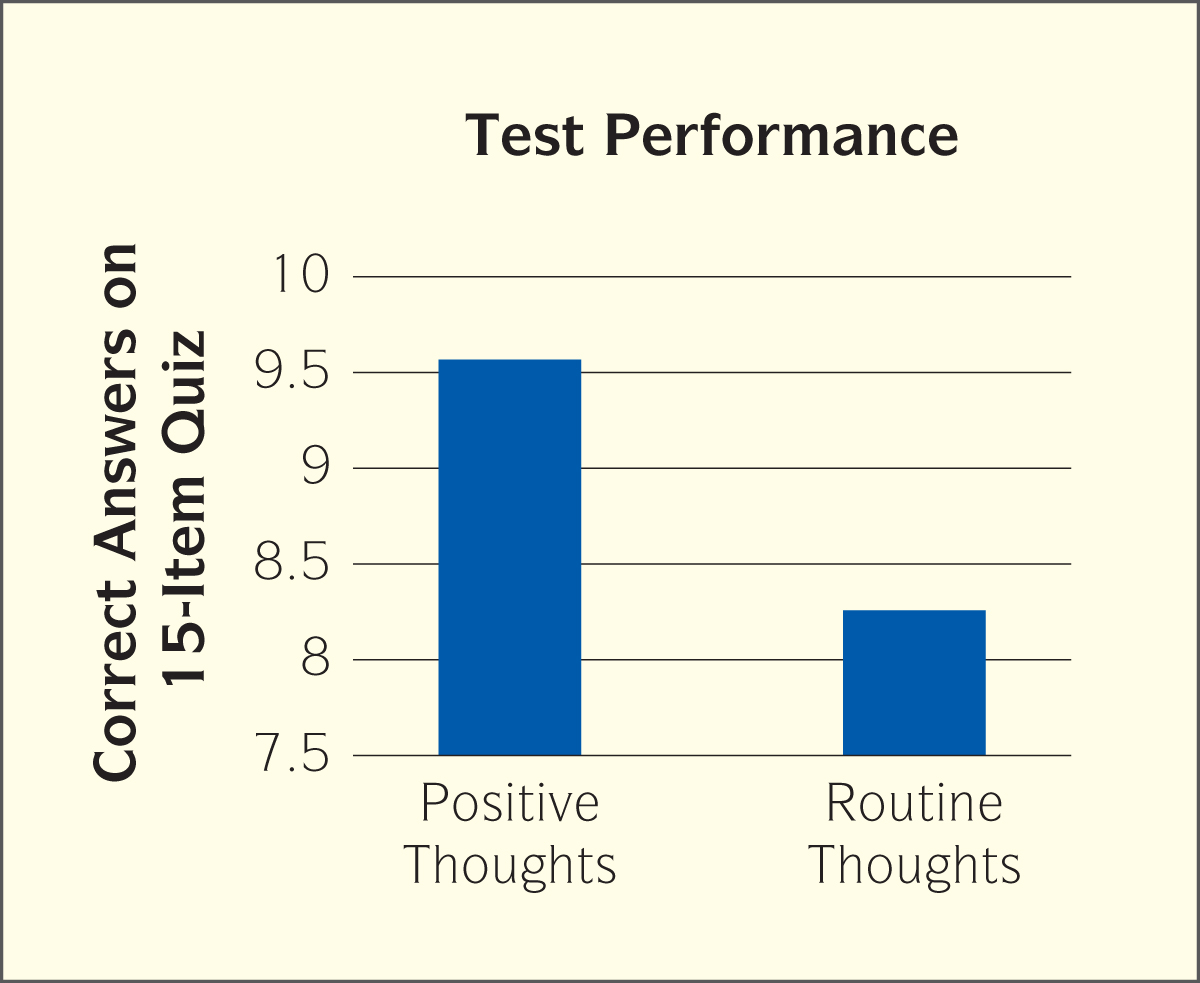Manage Test Anxiety
If you experience some level of test anxiety (nervousness or worry) before or during an exam, guess what? You’re normal. Research has found that between 25 percent and 40 percent of students have experienced test anxiety.2 In fact, a mild level of test anxiety is actually a good thing: It helps you stay attentive and focused while you prepare for and take the test. Intense test anxiety, though, can cause damaging, obsessive thoughts of failure (“I’m going to bomb this test”; “I know I’ll fail this class”). It can also spawn feelings of doom and dread following the test (“I just know I gave the wrong answer on question 9”). If you have intense test anxiety, you might experience physical reactions such as sweating, nausea, shortness of breath, or headaches. Your mind might even “go blank” during the exam.
Test Anxiety: Nervousness or worry about performance on an exam.
FOR DISCUSSION: In class, present the Yerkes-Dodson Law graph to provide students with a visual of the beneficial effects of anxiety. An example can be found at Changingminds.org.
The good news is that you can manage test anxiety and its negative effects — both before and during exams. To do so, try these tactics.
Breathing. Breathe in to the count of three (“one, two, three”) and breathe out in reverse (“three, two, one”). Repeat this pattern several times. Note how calm you feel as you exhale.
Muscle relaxation. Choose a muscle group, tense those muscles for a count of ten, and then relax them. For example, curl your toes tightly and then relax. Repeat or move on to another muscle group, such as your lower leg muscles and then upper leg muscles.
Preparation. If you feel especially anxious about tests when you’re not sufficiently prepared, add more time to your study schedule. Take practice tests to get comfortable with the test format.
Reframing. Reframe any negative thoughts about failing the test as positive thoughts. For example, if you’re thinking, “I’m going to freeze up,” write that down; then rewrite it as “I’ve worked hard, and this test will let me demonstrate my knowledge.” (See Table 9.1 for more reframing examples and the Spotlight on Research for more on the power of positive thought.) Put your positive statements in a prominent place you can see every day, and repeat them to yourself whenever you think about your next exam.
Visualization. Envision a place that relaxes you — a beach, a meadow, a forest — and visualize yourself in it. “Visit” this place in your mind to relax before or during an exam.
CONNECT
TO MY CAREER
Do you have a job now, or have you had one in the past? If so, write down a time when you experienced anxiety on the job. How did you manage those feelings? How might you manage similar feelings if they occur again? Select two strategies from this chapter, and explain how they could help you.
Worry time. This strange-sounding technique has helped many people manage anxiety: Plan twenty minutes each day for worrying about an upcoming test. During this “worry time,” focus as hard as you can on your worries. Set the timer on your phone, and at the end of the twenty minutes, stop worrying and go on with your day. If you feel anxious at other times during the day, put those thoughts and feelings aside until your next scheduled worry time.
Worry journal. Record all your worries in a journal. Write down what you’re afraid of, along with the emotions and physical sensations you’re experiencing. Then close your journal to symbolize that you’re setting aside your worries for the rest of the day. Or when you’re done writing, rip the page out of your journal, crumple it up, and “throw away” your worries.
Campus resources. Talk with a counselor about test anxiety or any other issues affecting your ability to succeed in school. If you experience test anxiety because you have difficulty understanding course material, work with a tutor to establish a regular study schedule and boost your confidence.
207
ACTIVITY: Conduct your own informal experiment: Ask students to think about taking a test in their most difficult class; then ask them to rate their anxiety on a scale of 1 to 10 and to record their scores. Have each student use a strategy for managing test anxiety during the week. In next week’s class, have students think about taking the test again and rate their anxiety. Did the results change?
FURTHER READING: To learn about a helpful method of reducing test anxiety, read “Worried about Performing Well under Stress? Write It Out,” written by Sian Beilock, Ph.D. (posted on the Psychology Today Web site, January 19, 2011).
| Negative thought | Positive reframe |
|---|---|
| I’m going to forget everything I’ve studied. | I’m well-prepared and I know the material. |
| I’m terrible at taking tests. | I’m getting better at taking tests. |
| If I fail, I’ll get kicked out of college. | It’s only one test, not my whole college career. |
| I’m not smart enough. | I am smart enough and I belong here. |

208
THE POWER OF POSITIVE THOUGHT: IT CAN HELP WITH TEST ANXIETY
spotlight onresearch
Not surprisingly, people who suffer from test anxiety tend to get lower scores on exams than those who don’t experience test anxiety.4 And they often experience negative feelings and expect to perform poorly. But there is good news: According to one study, you can combat these effects by harnessing the power of positive thought.

In a study by Donna Nelson and Ashley Knight, researchers asked 118 students to engage in a brief writing task and then take a quiz. Students in one group were asked to write about a recent successful experience, focusing on a time when they overcame a challenge and felt good about themselves. Students in another group wrote about what they did in a typical morning. Students then answered questions about their feelings, how they manage stress, and any anxiety they felt about the upcoming quiz. Then they took the quiz. Students in the positive-thoughts group:
Had more positive feelings, a more optimistic attitude, and less test anxiety than students in the routine-thoughts group
Had greater confidence in their stress-management skills than students in the routine-thoughts group
Performed better on the quiz than students in the routine-thoughts group
THE BOTTOM LINE
Simply remembering successes and thinking positive thoughts can help you reduce anxiety and perform better on exams.
REFLECTION QUESTIONS
Question 9.1
1. Have you experienced test anxiety in the past?
Question 9.2
2. If you have experienced test anxiety before, how do you think your attitude affected your performance?
Question 9.3
3. If you experience test anxiety now (or if you ever do in the future), what strategies will you use to manage it?
D. W. Nelson and A. E. Knight, “The Power of Positive Recollections: Reducing Test Anxiety and Enhancing College Student Efficacy and Performance,” Journal of Applied Social Psychology 40 (2010): 732–45.
voices of experience: student
PREPARING FOR TESTS AND
OVERCOMING TEST ANXIETY

| NAME: | Stephanie Young |
| SCHOOL: | Oklahoma City Community College |
| MAJOR: | Diversified Studies |
| CAREER GOAL: | Dental Hygienist |
“I calm myself down by breathing easily and slowly.”
When I was taking college algebra, I learned that I need to breathe. I would hold my breath through a portion of my tests because I had test anxiety, and one night I just told myself I have to get over this — it’s not going to work. Now, before an exam I make sure to set aside ten minutes just to look over my notes, to assure myself that what I’ve been studying isn’t anything to be afraid of. During this time, I calm myself down by breathing easily and slowly. I also run a lot, and I feel calmer when I run. I try to stay positive, because I know I’m not going to do well if I tell myself I’m not going to do well.
When I first started school, I would cram before tests, and it wouldn’t work. Cramming made my anxiety issues worse. I would also feel really burnt out, and then I wouldn’t do well. Now, I break up my studying. If there are ten things I have to learn for a test, I’ll focus on two things each day. Also, I’ll rewrite my notes and read over them throughout the day. If I can tell my husband how something works, then I feel comfortable about it, and I move on. I’m a mom and I have a four-year-old who needs my attention, too, so it works for me to study in small amounts.
I have a study buddy, and that makes preparing for tests a lot easier. I also use the biology lab at school. The lab assistants there are students, too, and are really knowledgeable. It’s reassuring to know that they’re learning what I’m learning and that I can move on like them. They’ll sit and tutor you, too, if you need a tutor. It’s hands-on in the biology center, and I really like that. Mingling with other students in the lab helps because sometimes what they’re learning is being taught in a different way.
YOUR TURN: If you experience test anxiety, have you used any of the strategies for managing it that Stephanie describes? If so, which ones? How have they worked for you? What (if any) other strategies have you found helpful?
209